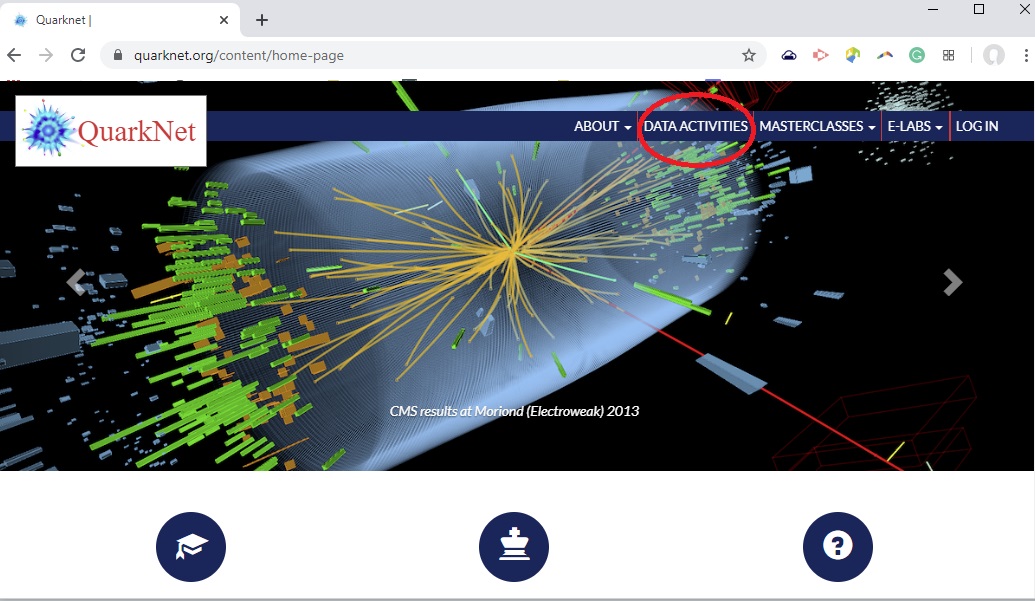Friday Flyer - April 10, 2020

Spotlight on the Data Activities Portfolio
QuarkNet's Data Activities Portfolio is an ever-growing collection of over 30 data-based activities that you can use with your students. You can access the portfolio by clicking DATA ACTIVITIES from the top menu on the QuarkNet website, including this page. Clicking on an activity will bring you to a description along with relevant teacher notes, student pages, and links to data. The activities are accessible whether or not you are logged into QuarkNet.org, however, logging in will allow you to view and submit comments for each activity. Recently, several comments have been posted on adapting activities to online instruction and are summarized on this page.
The portfolio activities range from simple to more complex levels, cover several curriculum topics, and align to one or more of three data strands: Cosmic Ray, LHC, and Neutrino. Your students can follow a path through activities in a data strand to better understand practices that lead to discovery. Learn more about how the portfolio is organized and how to sort activities in this screencast or by viewing Deborah Roudebush's slides from a recent AAPT meeting.


News from QuarkNet Central
Mentors and teachers at each QuarkNet center will decide whether and how they can meet this summer. Also, centers may want us to retool QuarkNet National Workshops such as Neutrino Data Workshop for remote online participation. If your center needs to change plans, postpone the workshop, or move it online, or has any request that might help, please let Spencer, Shane, or Ken know. We can work it out.
BAMC—Big Analysis of Muons in CMS—is quickly approaching. The latest:
- The date for BAMC is set for next Friday, April 17, with the physicist talk scheduled for Wednesday, April 15.
- The Student Launch and Teacher Launch pages are accessible from the QuarkNet website top menu. Go to MASTERCLASSES and they will be the last two choices in the dropdown.
- Teachers who have registered can expect an e-mail early next week with instructions on how students will register for the webinars, including the Wednesday physics talk and the Friday data discussion.

Physics Experiment Roundup
The Axion Dark Matter Experiment (ADMX) searches for the axion, a hypothetical elementary particle that is a dark matter candidate that could also solve the strong CP problem in particle physics. Learn how the ADMX experiment uses fake signals to train scientists in Dark Matter Decoys from symmetry.
Find out what CERN is doing to combat COVID-19 in CERN Pivots from Accelerators to Ventilators. Also from CERN (ATLAS, to be more specific): Measuring the beauty of the Higgs boson. From Physics Today, find out how advances in accelerator technology lead to discoveries in particle physics and beyond.

Resources
Don Lincoln is launching a new series of videos called Subatomic Stories. The first video in the series—Introduction to Quarks and the Cosmos—was just released this week.
Physics Today marks 30 years of the Hubble Space Telescope with a series of visualizations and articles, including Hatching Hubble, What Hubble has seen, visualized, How Nancy Grace Roman shaped Hubble, and Hubble's blurry years.
The physics travel guide can be a useful resource for teachers and students alike, explaining many physics concepts at three levels of difficulty. H/T Marge Bardeen
APS is offering a free virtual lecture on Saturday, April 18, by the Event Horizon Telescope scientist Sheperd Doeleman titled Seeing the Unseeable: Capturing an Image of a Black Hole. On a related note: Why are black holes so camera shy?
And lastly, a reminder that the QuarkNet Resources for Teaching Online site continues to be available and updated.

Just for Fun
Last Friday's Just for Fun featured chemists making cookies and physicists making fried rice. According to some recent data from Google and The Economist, turns out scientists aren't the only ones doing more cooking or baking when stuck at home. You may have your own data point here as well: the bare shelves for baking essentials in the grocery stores.
From xkcd: A helpful thermometer
We leave you with a couple of images showcasing the peaceful side of nature from this past week: reflections of this week's "super moon" and a home on a serene Minneapolis lake.
QuarkNet Staff:
Mark Adams: adams@fnal.gov
Ken Cecire: kcecire@nd.edu
Spencer Pasero: spasero@fnal.gov
Shane Wood: swood5@nd.edu
